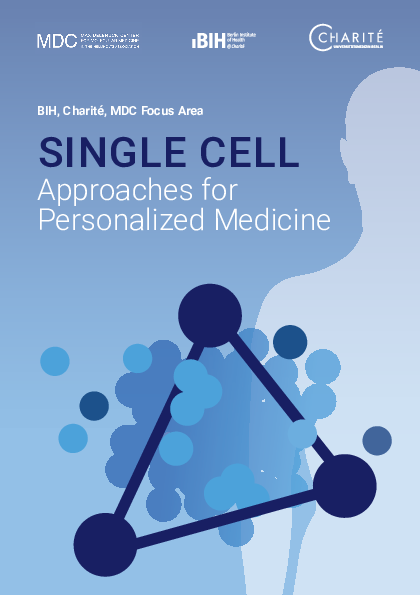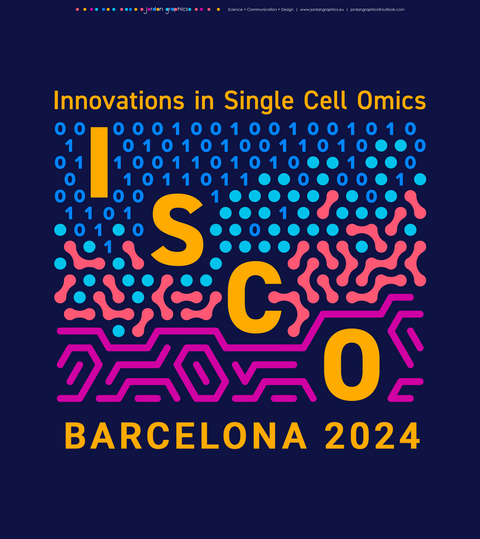
Single cell approaches for personalized medicine
Focus area together with the Berlin Institute of Health (BIH)
In order to make the highly innovative single cell approaches clinically usable for effective translation as quickly as possible, BIH is establishing a jointly supported, close interdisciplinary cooperation, in which BIH and Charité will contribute clinic-related expertise (bioinformatics, imaging, machine learning, oncology, neurology, dermatology, biobanks, diagnostics and biomarkers) and the Max Delbrück Center (BIMSB) technological and scientific expertise in the field of single cell biology and gene regulation.
The implementation is based on two pillars:
The establishment of four bridge junior research groups from BIH, Max Delbrück Center (BIMSB) and Charité, which bring single cell expertise into clinical application. These junior research groups are located in the BIMSB building, where they have access to the latest single cell approaches and are in close contact with leading international scientists*. At the same time, each of these groups is integrated into a clinic at the Charité where they identify clinically relevant topics, use and develop single cell approaches to address specific clinical issues and establish the technologies for clinical use. This bridge concept optimally combines the internationally leading position of the BIMSB in the development of single cell approaches with the clinical-translational potential of BIH/Charité.
The development of a "Clinical Single Cell Sequencing" pipeline, which includes a central bioportal (patient sample collection, characterization and processing) as well as an integrated workflow with relevant genomics and bioinformatics services for the participating clinics.
Single Cell Focus Groups
- Haas Lab
- Systems Hematology, Stem Cells & Precision Medicine
Cancer frequently originates from healthy stem and precursor cells that are responsible for the continuous regeneration of tissues and organs. A stepwise acquisition of genetic and molecular abnormalities transforms healthy stem and precursor cells into potentially malignant cancer cells. While this process occurs frequently, a complex interplay between the immune system, cancer cells, and factors from the microenvironment determine whether the newly emerging cancer cells are rapidly cleared or manage to establish a fully malignant cancer. The Haas group develops and applies novel multimodal single-cell and spatially-resolved technologies to study the complex etiology of hematological cancers and their interaction with the immune system. Another key objective of the research group is the development of next-generation precision diagnostic and prognostic technologies, based on high-content single-cell multi-omics technologies. These newly developed technologies aim at enabling early disease detection, highly precise, personalized treatment decisions and, ultimately, therapeutic intervention before disease onset.
Further Information
- Großwendt Lab
- From Cell States to Function
Cancer treatment is complicated by the ability of tumor cells to move and change their identity. This mobility and plasticity involves cellular programs similar to those used in embryonic development. In fact, tumor cells from some cancer types, such as neuroblastoma, are remarkably similar to cells that are normally only present during prenatal development. If we can understand more about why tumor cells display these embryonic characteristics, it might be possible to develop more effective therapeutic interventions. In our group, we compare the characteristics and behavior of embryonic cells with those occurring in different cancers. We use single-cell technologies to investigate genetic programs in abnormal cells and see how they are affected by their tissue environment. Our goal is to achieve a comprehensive understanding of how tumor cells utilize embryonic programs that can be used to improve early detection of cancers and develop more effective treatments.
Further Information
- Ludwig Lab
- Stem Cell Dynamics & Mitochondrial Genomics
Hematopoiesis describes the process of blood formation and is sustained by the activity of hematopoietic stem and progenitor cells throughout our lifetime. While our understanding of stem cell biology continues to grow, it still remains challenging to study the in vivo activity of individual stem cells in humans. To overcome this, we develop single cell multi-omic approaches, in particular to detect naturally occurring sequence variation in the mitochondrial genome of our cells. Notably, a large fraction of hematopoietic cells develops unique mutational profiles, which we utilize as natural genetic barcodes to enable lineage tracing/assessments of clonal activity across the stem and progenitor cell pool. In conjunction with genomic readouts of cellular chromatin accessibility, gene and protein expression profiles, we aim to unravel fundamental principles of stem cell dynamics and (de-)regulation in disease states, including leukemia. Moreover, an interrelated key objective of the group is the study of how mitochondrial genotypes contribute to cellular phenotypes in congenital disorders, aging and common diseases.
Further Information
- Sanders Lab (Max Delbrück Center)
- Genome instability and somatic mosaicism
During normal development and ageing the cells in our body can acquire somatic mutations through diverse genome instability processes. These mutations are propagated and selected for over time. As consequence, we are actually a mosaic of unique somatic cell genomes, where any given cell in a tissue may be genetically distinct from another. Understanding how somatic mosaicism develops and evolves are central questions in the Sanders laboratory. With a focus on the genome, we develop and apply innovative single cell methods that explore the mechanisms of genome instability to understand how mutations arise and change cellular phenotypes in normal human tissues and disease states. By integrating multi-omic experimental and computational readouts, we ask how individual cells differ in terms of their unique genomic profiles, epigenetic programs and transcriptional outputs, and directly test the functional outcomes of somatic mutations to understand how they contribute to tissue homeostasis and human disease.
Further Information
- Steering Committee
Speaker
Co-SpeakerProf. Dr. Angelika Eggert
Director Department of Paedriatrics, Department of Oncology and Hematology
Charité – Universitätsmedizin Berlin
MembersProf. Dr. Frank Heppner
Director Institute of Neuropathology
Charité – Universitätsmedizin BerlinProf. Dr. Norbert Hübner
Head of the lab "Genetics and Genomics of Cardiovascular Diseases"
Max Delbrück CenterDr. Jan Philipp Junker
Head of the lab "Quantitative Developmental Biology"
Max Delbrück CenterProf. Dr. Ulrich Keilholz
Director Charité Comprehensive Cancer Center (CCCC)
Charité – Universitätsmedizin BerlinProf. Dr. Ana Pombo
Head of the lab "Epigenetic Regulation and Chromatin Architecture"
Max Delbrück CenterProf. Dr. med. Frank Tacke
Department Head, Department of Hepatology and Gastroenterology
Charité – Universitätsmedizin Berlin
- BIH-CSCS-Pipeline Governance Board
- (reporting to the steering committee)
Chair
Prof. Dr. Ulrich Keilholz
Direktor des Charité Comprehensive Cancer Center (CCCC)
Charité – Universitätsmedizin BerlinMembers
Prof. Dr. Angelika Eggert
Director Department of Paedriatrics, Department of Oncology and Hematology
Charité – Universitätsmedizin BerlinProf. Dr. Frank Heppner
Director Institute of Neuropathology
Charité – Universitätsmedizin BerlinProf. Dr. Ana Pombo
Head of the lab "Epigenetic Regulation and Chromatin Architecture"
Max Delbrück CenterProf. Dr. Uwe Ohler
Head of the lab "Computational Regulatory Genomics"
Max Delbrück CenterSingle-Cell Tech leader (TBA)
Max Delbrück Center
Further links and information
- The LifeTime Initiative
- Gene Technology Report: "EINZELZELLANALYSE IN FORSCHUNG UND MEDIZIN" (German only)
- Helmholtz interview with Nikolaus Rajewsky: "Jede einzelne Zelle im Blick" (German only)
- Single Cell Omics Germany
Image: Alessandra Zappulo / Marina Chekulaeva Lab, MDC
Contact
Dr. Grietje Krabbe
Single Cell Project Manager
Berlin Institute for Medical Systems Biology (MDC-BIMSB)
Hannoversche Str. 28 | 10115 Berlin
E-Mail: Grietje.Krabbe@mdc-berlin.de
Phone: +49 (0)30 9406 4329













